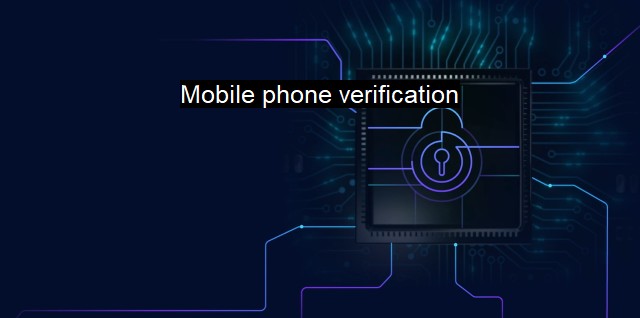What is Mobile phone verification?
The Significance of Mobile Phone Verification in Cybersecurity: Preventing Fraud and Enhancing User Experience
Mobile phone verification is a security measure employed by various online platforms, web sites, applications, and systems to validate and confirm a user's identity. This significantly contributes to cybersecurity processes such as user registration, transaction authorization, password recovery, and even two-factor authentication. With our growing reliance on digital technology, ensuring online safety and data privacy has become paramount - a task that mobile phone verification successfully helps us achieve.At its core, mobile phone verification is designed to solve a crucial flaw inherent in digitally-based systems - the verified identity. The core idea is that an individual in possession of a verified mobile phone number is in fact who they claim to be. mobile phone verification contributes to laying a foundation of trust in digital environments where scammers, hackers, and cybercriminals frequently operate.
The process typically entails providing a unique code sent via SMS or an automated phone call that users have to input onto an online forum or app, thereby confirming ownership of that particular number. In other scenarios, a QR code scanning could come into play, linking a user's mobile device with an online service. If someone cannot present this code, their identity or attempts to conduct an operation raises immediate suspicion.
The relevance of mobile phone verification revolves mainly around its buffer effect against cybersecurity threats. With robust antivirus systems and tools in place, mobile phone verifications significantly enhance the safety mechanisms by building an additional layer of protection. It provides an extra hurdle for cybercriminals attempting to access personal information, launch phishing attacks, or execute other illicit digital activities.
In our digital landscape, data breaches and suspicious digital activities are often implemented through mass automated bot attacks. By implementing mobile phone verification, systems can essentially eliminate or drastically reduce these types of cybersecurity threats. This is because every mobile phone number serves as a unique identifier attached to one user only, making it less feasible for a bot to recognize and capture it.
Phone verification comes as a handy tool for password recovery. Forgetting passwords is a frequent occurrence for many digital users. If that happens, a simple confirmation using your mobile phone number and granting access sounds both practical and safe.
Mobile phone verification has also been revered for its significant role in implementing two-factor or multi-factor authentication. Here, the user, after inputting their safety credentials (such as login and password), has to introduce a one-time password (OTP) sent to their verified mobile phone number. This OTP process is beneficial to both cybersecurity and antivirus safety operations, making the chances for a hacker to bypass this safety measure significantly slim - even if, unfortunately, the original password gets compromised or a virus attack pacing.
Using mobile phone verification isn't without its drawbacks. Such phone verifications have led to cases of SIM-Swap fraud, where fraudsters obtain a duplicate SIM card of the targeted victim and manipulate the verification process. some users may feel reluctant to provide their mobile numbers, perceiving it as an invasion of their privacy or a breach of their personal information.
Mobile phone verification is a widely employed measure in the domain of cybersecurity to combat the rising threat of digital fraud and data breaches. By unifying potent antivirus tools with mobile phone verification, it helps bolster online safety, strengthen data privacy, protect against cyber threats, and ascertain user authenticity.

Mobile phone verification FAQs
What is mobile phone verification and why is it important for cybersecurity?
Mobile phone verification is the process of verifying a user's identity using their mobile phone number. It is important for cybersecurity as it adds an additional layer of security to prevent unauthorized access to online accounts, websites, or applications.What are the benefits of using mobile phone verification for antivirus software?
Mobile phone verification benefits antivirus software in several ways. It enables two-factor authentication, which requires users to verify their identity using their mobile phone number to access their antivirus account. This helps prevent unauthorized access and data breaches. It also helps prevent fraudulent activities, such as false registrations or purchases, and enhances the overall security of the antivirus software.How does mobile phone verification work for cybersecurity purposes?
Mobile phone verification works by sending a verification code to the user's mobile phone number. The user then enters the code into the website, application, or account they are trying to access. This confirms that the person trying to access the account is the rightful owner of the mobile phone number. It is a secure method of authentication that is used by many companies to prevent unauthorized access and protect their users' sensitive information.Is mobile phone verification a reliable method of cybersecurity?
Mobile phone verification is a reliable method of cybersecurity as it adds an additional layer of security to prevent unauthorized access. However, like any security measure, it is not foolproof and can be circumvented by hackers. To enhance the security of mobile phone verification, it is important to use strong passwords, avoid sharing personal information online, and be cautious when clicking on links or downloading files from unknown sources.| | A | | | B | | | C | | | D | | | E | | | F | | | G | | | H | | | I | | | J | | | K | | | L | | | M | |
| | N | | | O | | | P | | | Q | | | R | | | S | | | T | | | U | | | V | | | W | | | X | | | Y | | | Z | |
| | 1 | | | 2 | | | 3 | | | 4 | | | 7 | | | 8 | | |||||||